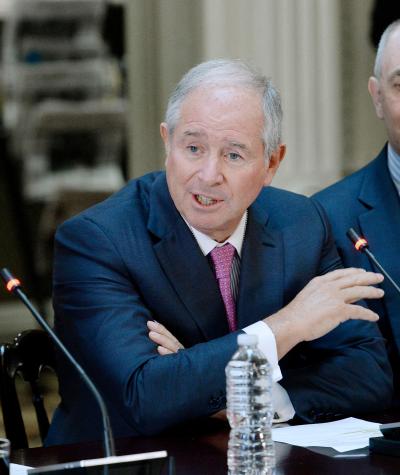On March 24, an hour before President Donald Trump alarmed public health experts by saying he wanted to “have the country opened up” by Easter in order to restart the economy, he and Vice President Mike Pence hopped on the phone with a few wealthy Wall Street executives. One of the executives on that call, according to reporting, was Blackstone CEO and Republican megadonor Stephen Schwarzman.
Schwarzman has given around $750,000 to Trump’s joint fundraising committee and gave millions to super PACs in past election cycles. But new campaign finance reports reveal that Schwarzman has dramatically increased his political giving in recent months.
Recent Federal Election Commission (FEC) reports show that in February, Schwarzman wrote a $10 million check to Senate Leadership Fund, the super PAC closely aligned with Senate Majority leader Mitch McConnell. It was his single largest donation to date and made him responsible for 80% of the $12.5 million raised by the super PAC last month. A month prior, Schwarzman gave $2.5 million to Congressional Leadership Fund, a super PAC devoted to electing House Republicans.
When a small number of ultra-wealthy donors provide an overwhelming amount of funding to party- or candidate-aligned super PACs, those donors are afforded enormous influence. Megadonors get the opportunity to tell the president how public health measures impact their stock portfolio; frontline healthcare workers or families who are victims of the coronavirus pandemic do not receive similar access.
From executive branch decisions to Congressional carve-outs in the $2 trillion stimulus package, the problems with money in our political system are amplified in moments of national crisis, when Americans should be able to have confidence that elected officials are acting in the best interests of the country, not the best interests of their parties’ wealthy donors.
Next month’s FEC reports, which reflect March 2020 fundraising, will show which wealthy special interests were giving to whom as the coronavirus pandemic gained momentum. But last week’s FEC reports revealed other ongoing trends:
1. Pop-up super PACs keep popping
In the weeks leading up to the March 3 North Carolina U.S. Senate primary, voters were hit with $4.5 million in ads promoting Cal Cunningham from a newly-created super PAC called Carolina Blue. But voters went to the polls without knowing who was behind the group because it timed its spending to avoid disclosing its donors until weeks after Election Day.
The name “Carolina Blue” implies that it is a locally grown North Carolina operation. When Carolina Blue filed its FEC report last week, however, it revealed that it was a front for Senate Majority PAC (SMP), the Washington, D.C.-based super PAC aligned with national Democrats. All of Carolina Blue’s money came from SMP.
Additionally, there was Persist PAC, the super PAC formed in the final stretch of Elizabeth Warren’s presidential run. It reported about $15 million in last-minute spending on pro-Warren ads, all in states with imminent primaries. Last week’s FEC report showed that the group was almost entirely funded by California physician Karla Jurvetson, who gave $14.6 million out of the $15.1 million raised by the PAC.
This is not a new tactic. In the 2018 election cycle, CLC counted more than two dozen super PACs that together spent over $8.1 million in primary elections around the country but did not disclose their funding sources until after the elections had passed. As with Carolina Blue, some apparently local super PACs turned out to be fronts for national interests: for example, the “Mountain Families PAC,” which spent $1.3 million in West Virginia’s 2018 U.S. Senate primary, revealed after the election that it was almost entirely funded by the national super PAC Senate Leadership Fund, associated with Mitch McConnell.
What can be done? One legislative solution would be to require PACs to report all large, last-minute contributions within 48 hours of receiving them. Candidate committees are already required to report within 48 hours all contributions of $1,000 or more received in the final 20 days before an election; creating an analogous requirement for PACs would thwart these donor disclosure dodges.
The sweeping democracy reform legislation H.R. 1, the “For the People Act,” includes an amendment authored by Rep. Brad Schneider requiring the FEC to issue a report to Congress on how to close this pre-election disclosure loophole. The last-minute reporting requirement would be an easy legislative fix for the FEC to suggest.
2. Publicly traded corporations keep giving
The Supreme Court opened the floodgates to corporate political spending with the 2010 decision Citizens United v. FEC, with Justice Anthony Kennedy writing for the majority that corporations are just associations of citizens who individually have free speech rights.
If that’s true, corporate funds belong to shareholders. And what’s to prevent CEOs from using shareholder money to fund political contributions that some shareholders disagree with?
Not much.
For example, FEC reports show that last month, the publicly traded corporation Valero Energy gave $50,000 in shareholder funds to the “Future Leaders Fund,” a super PAC created by Rep. Will Hurd, a retiring Texas congressman. Last month’s FEC reports also showed a $100,000 donation to Club for Growth Action from a branch of the publicly-traded Ashford Inc. There is no indication that shareholders had any say in these super PAC donations.
But at least shareholders could learn about those contributions from FEC reports. Corporate donations to dark money groups are not publicly disclosed (although some shareholders have been pushing companies to be more transparent).
In Citizens United, U.S. Supreme Court Justice Anthony Kennedy promised that corporate shareholders would be able to use the “procedures of corporate democracy” to ensure that their “corporation’s political speech advances the corporation’s interest in making profits.” In order to bring Justice Kennedy’s promise closer to reality, Rep. Jamie Raskin has introduced the Shareholders United Act, which would require shareholder approval for corporate political spending. Its provisions were included in H.R. 1.
